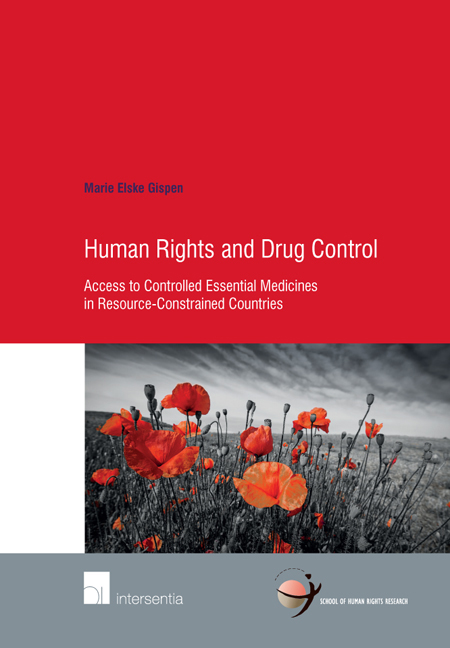 Human Rights and Drug Control
Human Rights and Drug Control Book contents
- Frontmatter
- Acknowledgements
- Contents
- List of Abbreviations
- Table of Instruments
- Table of Cases
- List of Figures and Tables
- Part 1 Concept and Problem
- Chapter 1 Introduction
- Chapter 2 Access to Controlled Essential Medicines: Context, Background, Framing, and Focus
- Part 2 Normative Framework
- Part 3 Country Studies
- Part 4 Conclusions and Recommendations
- Appendix I Interview Protocol Uganda
- Appendix II Interview Protocol Latvia
- Samenvatting (Dutch summary)
- Selected Bibliography
- Index by Paragraph
- Curriculum Vitae
- School of Human Rights Research Series
Chapter 1 - Introduction
from Part 1 - Concept and Problem
Published online by Cambridge University Press: 27 September 2018
- Frontmatter
- Acknowledgements
- Contents
- List of Abbreviations
- Table of Instruments
- Table of Cases
- List of Figures and Tables
- Part 1 Concept and Problem
- Chapter 1 Introduction
- Chapter 2 Access to Controlled Essential Medicines: Context, Background, Framing, and Focus
- Part 2 Normative Framework
- Part 3 Country Studies
- Part 4 Conclusions and Recommendations
- Appendix I Interview Protocol Uganda
- Appendix II Interview Protocol Latvia
- Samenvatting (Dutch summary)
- Selected Bibliography
- Index by Paragraph
- Curriculum Vitae
- School of Human Rights Research Series
Summary
It is time for regulations that put lives and safety first.
Kofi Annan, 2016A bird's-eye view
The general topic of this book is access to controlled essential medicines under the interplay of human rights and drug-control norms. The exact focus and approach are elaborated in this introductory chapter. For the purpose of definition, controlled essential medicines are those medicines whose active substance is listed in one of the schedules of the international drug-control treaties, which regulate their availability and accessibility. Yet at the same time, these medicines appear on the Model List of Essential Medicines as developed by the World Health Organization (WHO), meaning that human rights law also regulates their availability and accessibility. Controlled substances are all those substances scheduled under the international drug-control treaties. It is important to distinguish between controlled medicine and controlled substance because only part of all controlled substances has a clear and evidence-based medical potential.
Throughout this study, morphine and codeine, essential pain-control medicines, serve as leading examples. This implies that the central topic is addressed from both a (general) controlled essential medicines perspective, as well as a specific (or applied) pain-control medicine angle. It is important to clearly mark this purposeful distinction from the start so as to avoid confusion in concept, focus, and analysis throughout the book. The reason for this differentiation is that the interplay of human rights and drug-control norms affect more medicines than just morphine and codeine, and thus warrants the inclusion of a more general focus. However, in terms of application, it will be more insightful to concentrate on part of the medicines involved in order to strengthen and deepen the analysis.
The issue of controlled essential medicines and the severity of their absence are best demonstrated by the situation of Remedios Ramirez Facio, a 73-year-old woman with pancreatic cancer. In an interview with Human Rights Watch, Remedios said: ‘[With the pain] I didn't have the desire to do anything. I wasn't hungry and didn't want to walk (…) nothing. It would anger me when people spoke to me (…) [With palliative care] I have come back to life.’
Remedios receives palliative care at Mexico's National Cancer Institute. She is lucky to receive this treatment including pain-control medication such as morphine, which drastically changed her life.
- Type
- Chapter
- Information
- Human Rights and Drug ControlAccess to Controlled Essential Medicines in Resource-Constrained Countries, pp. 3 - 26Publisher: IntersentiaPrint publication year: 2017


